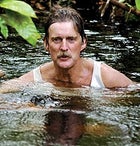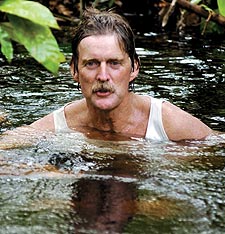SIR PETER BLAKE WAS A LANKY sort of icon, six feet, four inches of weather-beaten grit embellished with a staggering record of sailing accomplishment. The New Zealander was the only skipper tough enough to sail the first five Whitbread Round the World races, starting out in 1973 and finally winning the grueling event in 1990. Four years later, Blake coskippered the 92-foot catamaran Enza to a global circumnavigation record of just under 75 days, winning the Jules Verne Trophy. Then, in 1995, he topped it all by leading New Zealand to a resounding victory over the United States in the America’s Cup. It seems a shabby irony, then, that in December a man who lived to defy the dangers of the Southern Ocean found an early death in an Amazon River port at the hands of petty thieves.
EXCLUSIVE: MURDERED BY PIRATES
Peter Nichols tells the complete inside story behind the death of Sir Peter Blake in ���ϳԹ���‘s May issue, on stands now Sir Peter Blake in South America, two months before his death
Sir Peter Blake in South America, two months before his death
Since the mid-1990s poverty and easy access to weapons have created a terrifying new breed of pirates—lethal threats to both merchant ships and pleasure craft from the Gulf of Aden to the Caribbean. “The situation has deteriorated dramatically in recent years,” warns World Cruising Routes author Jimmy Cornell, who says Latin America ranks high among piracy trouble spots. In Macapa, Brazil, where Blake, 53, and his 119-foot schooner Seamaster were waiting to clear customs on December 6, the local cutthroats even have a name: rátos de agua, “water rats.” When a gang swarmed aboard late that evening, Blake tried to fight them off with a rifle and was shot dead. The six perps, who netted only a few valuables, were quickly rounded up and charged with murder. At press time, a verdict in their trial was still pending.
Meanwhile, the sailing world has suffered an immense loss. “He was a natural leader who attracted considerable loyalty,” says Sir Robin Knox-Johnston, Blake’s coskipper on Enza. Even his rivals admired him. Blake “pushed the sport in many great directions,” says Lincolnville, Maine-based skipper Cam Lewis, who helped win the Jules Verne Trophy in 1993 but lost the coveted circumnavigation record to Blake a year later. “He did a lot of good things, and he did them well.”


